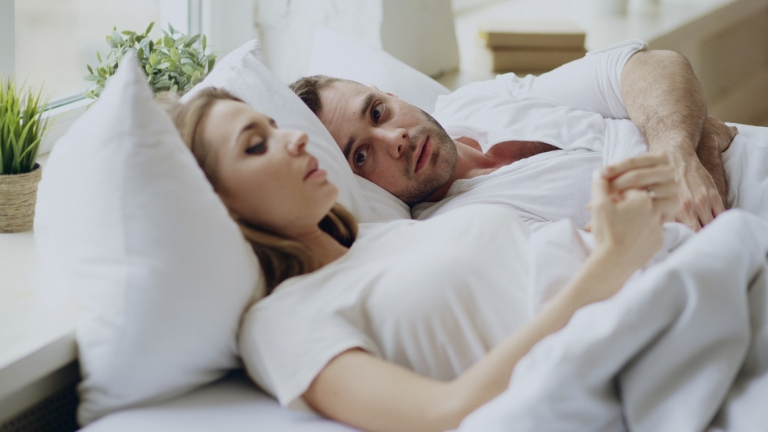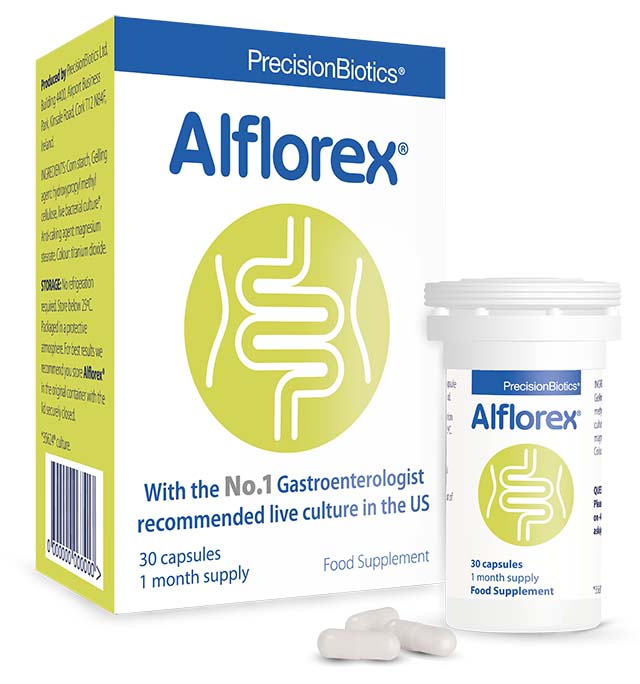If so, you’re not alone. Bloating, flatulence, constipation – IBS symptoms like these affect a staggering 41 per cent of women, and they’re having a devastating effect on our relationships, new research has revealed. Anna Magee reports
Bloating, flatulence, constipation, tummy cramps. Sound familiar? Gut symptoms like these are incredibly common and it’s no secret that some 10-20 per cent of the population suffer with Irritable Bowel Syndrome (IBS).
more shockingly, one in five have refused to have sex with their partners
However, a staggering 41 per cent of us have symptoms of IBS but are yet to be diagnosed, a new survey by Healthista, commissioned by Alflorex, has found.
Perhaps more shockingly, one in five have refused to have sex with their partners – even when they have wanted to – because of gut symptoms such as bloating, flatulence, tummy cramps and constipation.
The research, which polled 1600 UK women aged 25-65 is published today in Healthista’s first Gut Health and Relationships Survey, to coincide with IBS Awareness Month in April.
Gut health is a subject close to our hearts at Healthista HQ, which is why we are doing a Gut Health Special throughout April. It will include daily tips and tricks proven to help and weekly expert advice you can trust.
Here are our survey findings in detail, with expert advice from Dr Simon Smale, consultant gastroenterologist and trustee of the IBS Network.
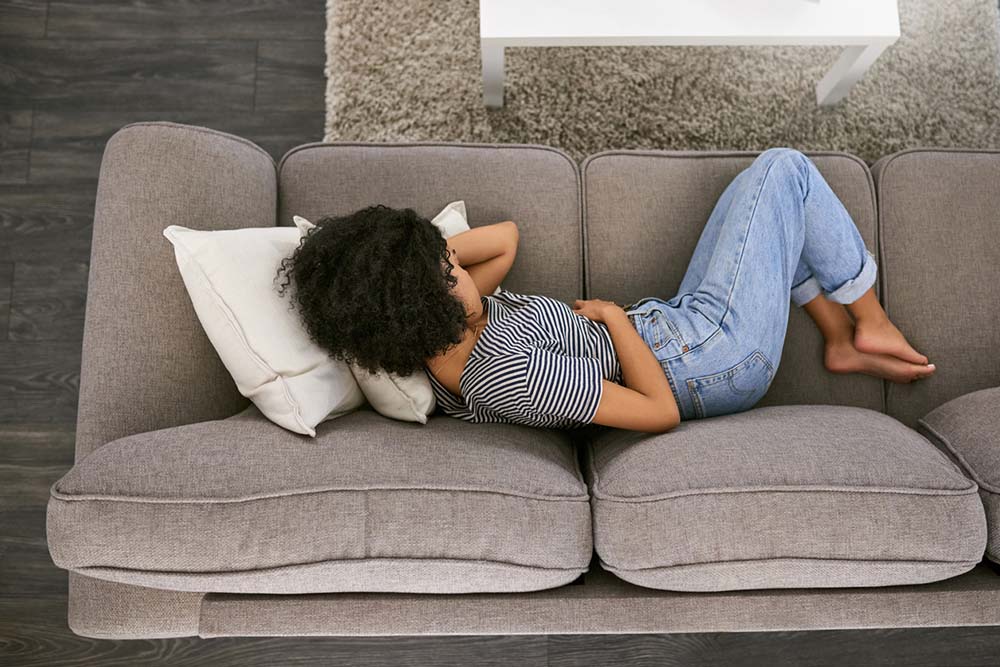
Almost 60 per cent of women suffer with IBS symptoms but two thirds remain undiagnosed
While 18 per cent of women surveyed said they had Irritable Bowel Syndrome (IBS), another 41 per cent said they suffered with symptoms such as abdominal pain, bloating and flatulence but had never been diagnosed with IBS.
‘The gut has only a limited number of symptoms it can give you to signal that something is wrong,’ says Dr Smale.
doctors should be more open to giving people with such symptoms a diagnosis of IBS
‘Because a number of other serious conditions such as some cancers and inflammatory bowel diseases can also present with the same symptoms, doctors are often much more concerned about not missing these, and will always investigate for those and sometimes overlook IBS as a diagnosis in itself.’
However guidelines by the National Institute of Clinical Care and Excellence (NICE) state that people who have abdominal pain, bloating and either constipation or diarrhoea should be given blood tests to rule out other conditions such as coeliac disease (an auto-immune disease in which the body can’t process gluten) and gut inflammation.
Once other conditions have been ruled out, doctors should be more open to giving people with such symptoms a diagnosis of IBS, Dr Smale suggests.
One in five women have refused sex even though they wanted it because of their gut symptoms
It’s one thing to have a headache – real or as an excuse – but being up for it and holding back because of embarrassment or pain is not good for either you, or your relationship and one in five of us have refused sex that we wanted because of our gut symptoms.
A further 20 per cent of respondents said IBS and other gut problems – most notably, bloating – stopped them revealing their body to a new partner and 18 per cent said it had stopped them from becoming intimate with a new partner altogether.
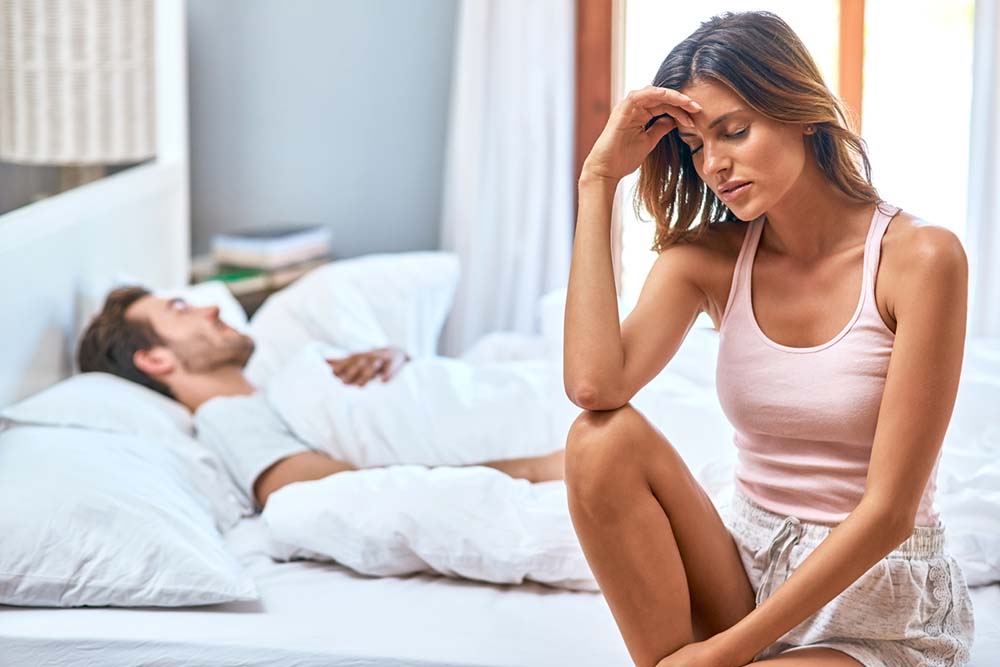
‘Many women I speak to feel that they can’t hide their bloating or flatulence and many I see are deeply distressed by their symptoms,’ says Dr Smale. Society places cultural expectations on women to be delicate and not to show any bodily functions.
‘As a result, women are often worried about the effect on of their gut symptoms on their relationships but I speak to their partners and they’re much less worried about any of that. Often, the men are more like, ‘Well, everybody farts. I fart, it’s certainly not a deal-breaker for me.
‘We all strive for a sort of intimacy in our relationships and that is difficult for women when they’re worried about passing wind or that they might lose control of their bowels – I see so much of that in my clinic and it’s terribly distressing for my patients, it thwarts intimacy because they can’t let go and enjoy it, they’re so worried they might pass wind or worse at an inopportune moment.’
Flatulence is by far your most embarrassing symptom
It was no surprise to us that flatulence was the most embarrassing gut problem of all for some 35 per cent of women, followed by bloating which caused the most shame for over 17 per cent of women.
Almost 30 per cent of women have held in flatulence for so long that it resulted in crippling pain
For even the most confident woman, letting out trapped wind in front of a partner, new or old is still a big move; after all, what is a funny and almost competitive game for men is highly embarrassing and almost shameful for a lot of women.
Indeed, a staggering 29 per cent of us regularly hold in their trapped wind for so long, it causes unbearable pain.
And, while most people revealed their gut symptoms to a new partner in the first 1-3 months of a relationship, 7 per cent took over a year to reveal their suffering and almost 5 per cent in a long-term relationship still hadn’t told their partner about their bloating, flatulence or other gut issues.
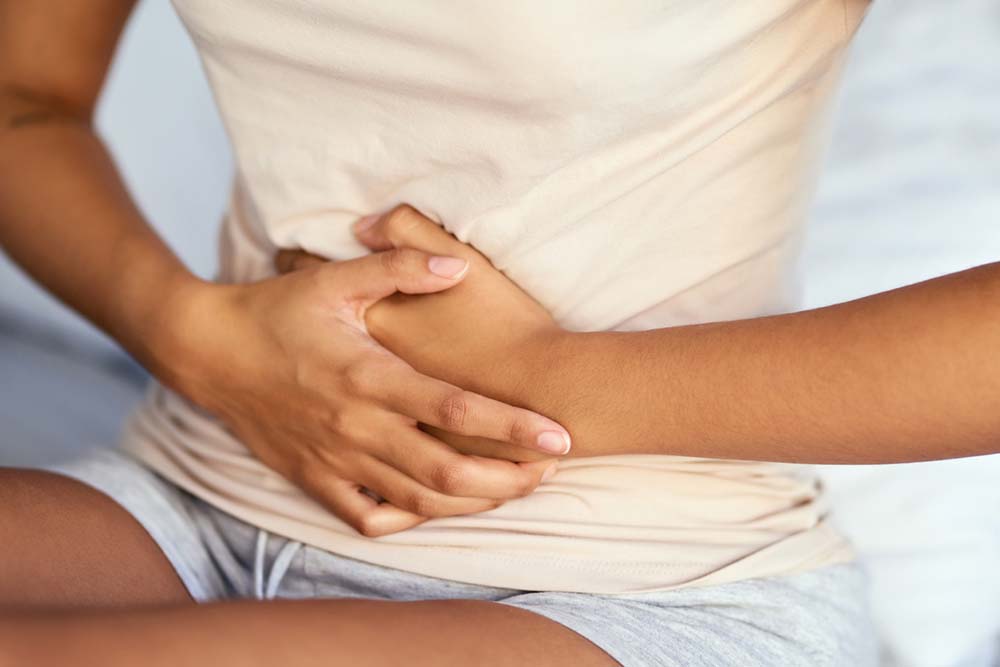
‘The embarrassment about flatulence is cultural,’ says Dr Smale. ‘We know a third of people with IBS are men, but when they have been questioned in the past, flatulence is much less of an issue. Men think it’s funny whereas women find it distressing; they think everyone can smell it. That’s much more about society’s expectations than anything biological.’
‘Wind usually results from the fermentation of sugars in the large bowel that then produce gas, which is perfectly normal,’ says Dr Smale. ‘It can also be caused by drinking a lot of fizzy drinks, including fizzy water.’
Is holding in your farts harmful then? ‘It might make you more uncomfortable but it won’t make it worse or lead to anything serious,’ says Dr Smale, who suggests a number of positions that can help release trapped wind.
29 per cent of us regularly hold in their trapped wind for so long, it causes unbearable pain
‘Lay on your back and put your bum in the air with one leg crossed against the other knee to help release wind,’ he suggests. ‘Or, try going on all fours with your tail end pointed up in the air.’
Also, if you’re constipated, he suggests raising your feet onto a footstool while you are on the loo. ‘This mimics the ‘squatting’ position that is a more natural defecating position for humans than sitting on a toilet ever was. That’s what we did in the jungle and it’s what we’re designed to do.’
Over 20 per cent have felt too bloated to go out
Gut issues have caused relationship problems in different ways for our readers. One in five had had arguments with significant others because they have felt too bloated to go out, another 19 per cent because of shame about the way their body looks.
Feeling undesirable is no fun in this world where the pressure to be Instagram-perfect 24/7 is high. But for 35 per cent of our readers, flatulence made them feel most undesirable, followed closely (30 per cent) by embarrassing toilet experiences such as urgent diarrhoea, and the smells and sounds that come with gut symptoms.

22 per cent of women have had anxiety, depression or mood issues because of their gut issues
Your day to day mood affects not only your other half, but every relationship in your life. And, for 22 per cent of women, problems like bloating, flatulence and tummy cramping also caused deep-seated mental health issues such as anxiety, depression and low mood. See below for Dr Smale’s suggestions on what helps.
we see a lot of depression, anxiety and mood issues in people with gut problems
‘Your gut and your stress levels are inextricably linked,’ says Dr Smale. ‘In fact, the gut is the organ with the greatest number of nerve cells in the body, even more than the brain and we know the gut has the greatest quantity of serotonin within it which is the neurotransmitter we associate with mood and happiness. So you can imagine if your gut is going awry, those feelings will influence your emotions and vice versa.
‘That’s why we see a lot of depression, anxiety and mood issues in people with gut problems – but we rarely know which came first, the mood problems or the gut issues, they both impact eachother.’
Gut issues are a long-term problem for Britain’s women and most doctors don’t help
Staggeringly, a quarter of women surveyed had been experiencing gut symptoms for the last ten years and 23 per cent for the last five years.
However, while 38 per cent had seen a doctor for their symptoms, a shocking 70 per cent of those said they didn’t help the problem.
a quarter of women surveyed had been experiencing gut symptoms for the last ten years
Moreover, many of us are suffering in silence, says Dr Smale. ‘I got to parties and as soon as I tell people what I do they corner me and ask me a million questions, mostly about their flatulence and bloating because they don’t feel listened to by their doctors.’
23 per cent have bought clothes one size too big because of bloating
Type ‘bloating’ into Google and you’ll get some 55 million responses. In fact, bloating was the most prevalent gut symptom for 33.6 per cent of women and, 23 per cent had bought clothes that were one size too big for them because of belly bloat.
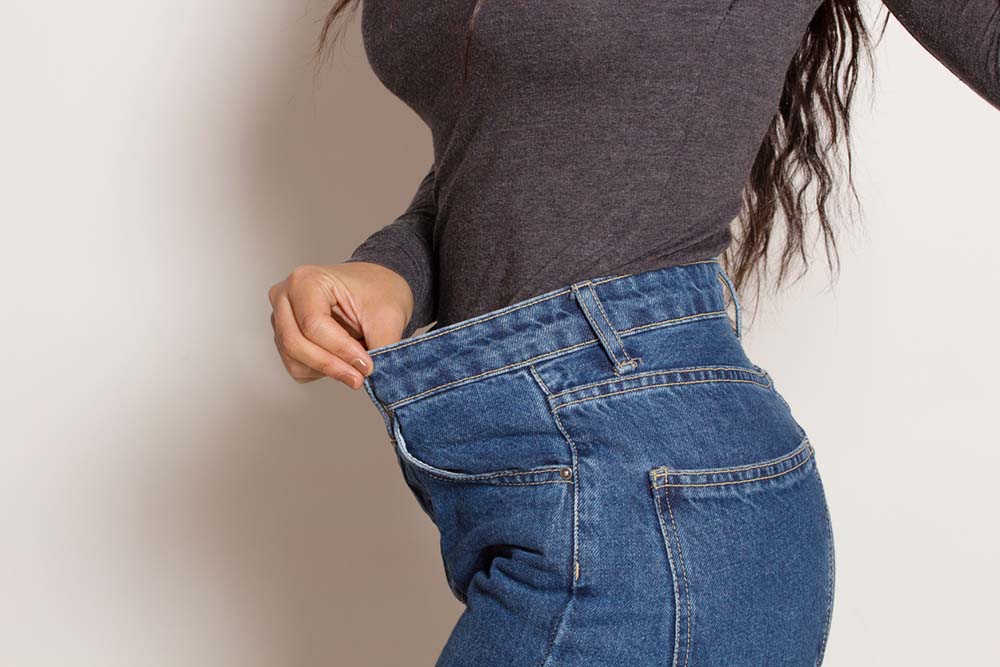
That was followed by flatulence, which a quarter said was their most prevalent symptom, then abdominal cramping and pain, which were the chief problem for 23.7 per cent.
‘Being awake all night,’ ‘not being able to eat’ and ‘Don’t leave the house much at all for fear of being caught short’ were just some of the saddening comments readers specifically sent us about the consequences of their gut symptoms.
34 per cent have tried exercise
Hats off to the Healthista reader, as exercise is one of the best things you can do for your gut health, says Dr Smale (see below). 34 per cent of our readers had indeed used exercise to manage their symptoms.
Meanwhile, almost one in five relied on yoga and relaxation to lessen the effects of their gut problems. Were they on the right track? See Dr Smale’s tips below.
Almost 30 per cent have cut out one or more food groups
Cutting out wheat, gluten or dairy was a tempting option for 29 per cent of our readers, while 12 per cent had tried food intolerance or allergy testing and over one in ten had been tested for coeliac disease.
Among the specific responses we received about how readers managed their problems, a Low FODMAPs diet was a popular response (see below), as was going gluten free.
Cutting out fizzy drinks (see below) and going sugar free also helped for some.

5 BLOATING AND FLATULENCE FIXES – THE EXPERT’S TIP LIST
Dr Smale suggests simple lifestyle changes that can help
Cut out fizzy drinks
‘These create gas in the intestine that leads to flatulence,’ says Dr Smale – even the diet ones. They contain indigestible sugars which have adverse effects on the gut and can lead to trapped wind. Caffeine and alcohol have a similiarly negative effect on the gut and can promote wind.’
Get out of breath a few times a week
Exercise has been shown countless times to help gut symptoms from flatulence, to bloating and constipation.
‘Exercise that gets you out of breath such as jogging or speed walking at intensity done for half an hour a few times a week helps both bowel function and heart rate,’ says Dr Smale. ‘I saw someone only this morning that said exercising three times a week cured all of their bloating.’
Try a FODMAPs diet (but with the help of a dietitian)
‘Diet is important to gut function,’ says Dr Smale. ‘Not skipping meals and avoiding processed and sugary foods is a good start. But if those things aren’t working, it is worth seeing a dietitian and trying out a specific exclusion diet such as the low FODMAPs diet,’ he recommends.
The low FODMAPs diet has been shown in numerous studies to help alleviate the symptoms of IBS. The term FODMAP stands for ‘fermentable oligo-, di-, mono-saccharides and polyols’ which are scientific terms used to classify groups of carbohydrates that are known to trigger digestive symptoms like bloating, gas, stomach pain and other common symptoms found in IBS sufferers.
Food such as onions, lentils, rye, cabbage, broccoli, Brussels sprouts, beans and dried fruits are all high in FODMAPS and so are poorly absorbed by the gut. As a result, they pass through and into the colon where they are fermented by bacteria. This leads to excess gas being produced that causes cramping, bloating, wind and pain.
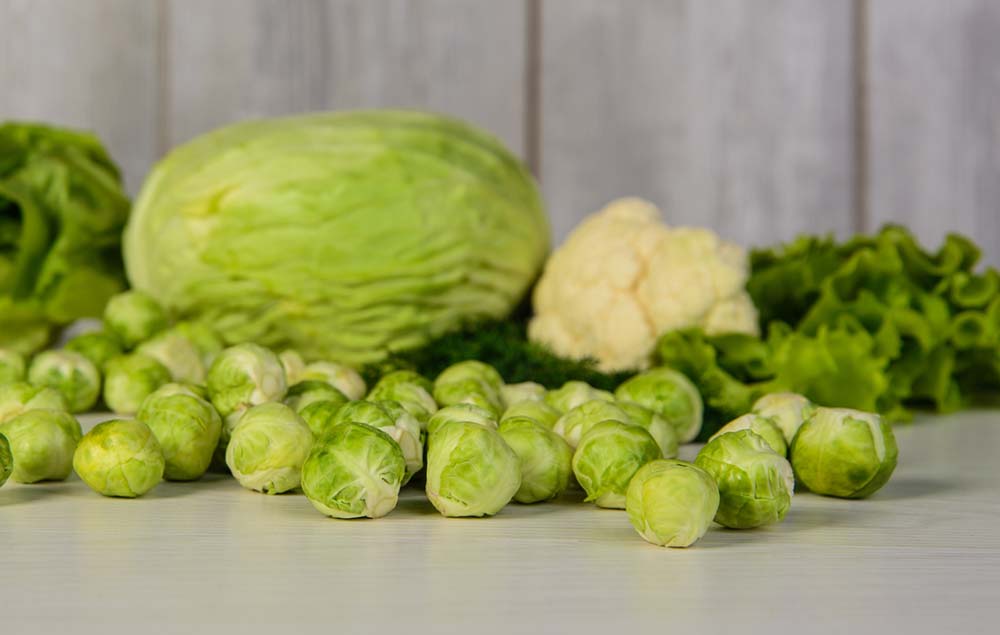
A 2016 study published in the journal Gastroenterology and Hepatology, indicates that restriction of FODMAP foods is an effective dietary intervention for reducing IBS symptoms.
‘It’s important to see a dietitian if you’re going to try this or any other exclusion diet for your IBS to ensure you’re not missing out on essential nutrients,’ says Dr Smale. Find a dietitian at The British Dietetic Association.
Try a probiotic targeted to IBS
If people have tried probiotics in the past and found they haven’t worked, they may need to try one of the new probiotic strains that are specifically targeted toward alleviating IBS symptoms, Dr Smale suggests.
A new probiotic, called Alflorex, is the result of more than 15 years of clinical research and 75 leading scientific publications and contains a probiotic strain called B. infantis 35624 which specifically targets and alleviates the symptoms of IBS.
Gut bacteria plays an important role in many digestive health issues, says Dr Smale. But the effects of probiotics are strain specific, while one might work on IBS, another might work on immunity.
‘A bit like different drugs have different effects, different bacteria strains have different effects on your symptoms,’ he says. ‘B. infantis 35624, the specific strain in Alflorex, is one of the few products that has been truly developed on a scientific basis and tested in high quality clinical studies to help specifically with the symptoms of IBS.’ Find out more here.
Deal with stress
We can’t emphasise enough the effects of taking care of your stress levels. ‘Getting enough sleep is important, as is using things like yoga and relaxation to deal with the pressures of life.
‘Hypnotherapy can really help with gut problems too,’ Dr Smale says. You can look for a hypnotherapist specialising in gut problems – talk to your doctor, the waiting list for getting this on the NHS may be long, but you can find a private practitioner at the British Society for Clinical Hypnosis.
More Healthista Content:
Will eating red meat lead to an early death? Here’s what the scientists say
Periods and exercise – How to sync your workout to your menstrual cycle
‘I found out I was HIV positive while I was pregnant’
My boyfriend doesn’t satisfy me sexually – therapy
Like this article? Sign up to our newsletter to get more articles like this delivered straight to your inbox.



